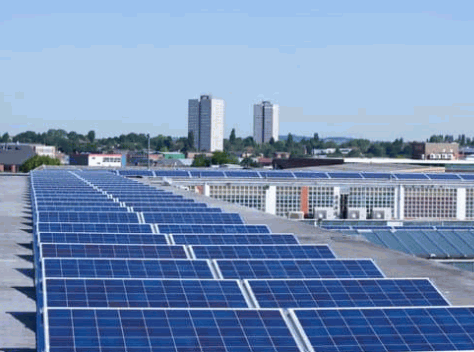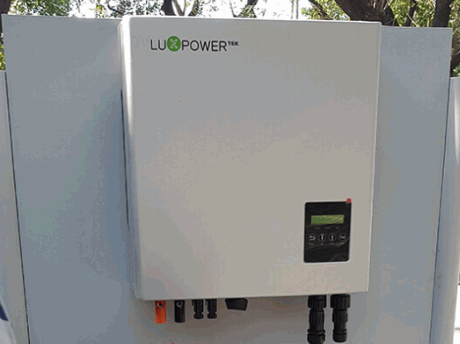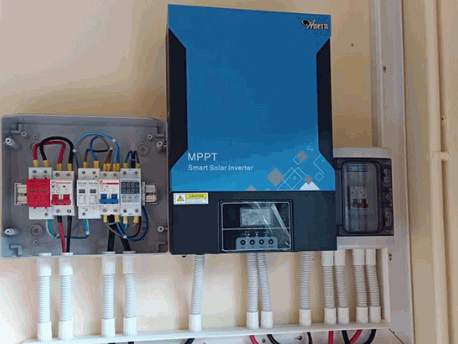Are you thinking of installing solar panels but you're overwhelmed and confused by the choices? You might also have problems understanding the terminology, as many companies and manufacturers use terms that sound the same but have completely different meanings!
This is the case with hybrid solar systems, so we're taking a moment to explain this in detail so that you can make the right choices. We're also looking into some related terms that will be useful when choosing which solar panel system to choose.
If you Google solar panels or hybrid solar systems, you'll get a page full of results from leading solar panel installers or manufacturers, and maybe a few sites devoted to renewable energy.
Each of them will have their own take on what a hybrid solar system is, which isn't much help to the customer. Currently, there are generally two or three referred to as hybrid systems, so we'll concentrate on these ones.
In the past, solar panels were used to produce hot water alone. Solar collectors inside the panels absorbed sunlight and used this to heat a special liquid (water and glycol) that was piped to a hot water cylinder.
In the last couple of decades or so, however, photovoltaic cells have proved to be extremely popular. These solar panels convert sunlight into electricity that powers our homes and businesses. Although both types use sunlight, the thermal variety absorbs heat, while the PV model creates an electrical charge using the photovoltaic effect.

This occurs when photons (light particles) from the sun strike a semiconductor (usually a thin layer of silicon) in the solar modules. As the photons hit the semiconductor, they knock electrons from the atoms, creating an electrical charge that can be collected. This is gathered and sent to a solar inverter that converts it into usable electricity.
And if you have a solar battery, you can store any energy you don't use and sell this to the electrical grid.

Fairly recently, someone had the brilliant idea of combining solar thermal and solar PV to make the hybrid solar PV-T system (also sometimes called the hybrid solar PV system). This provides hot water and electricity, and it is a highly efficient system that's set to become more widely used as word catches on.
As yet, however, it is still regarded as a niche product and few installers in the UK are familiar with the installation procedure or technical details. Because of this, prices tend to be higher, although these systems are around 25% more efficient than thermal or PV panels by themselves.
Some sources mention a hybrid solar power system based around a new type of solar inverter that works alongside solar batteries. It is basically an enhanced solar PV system and solar thermal panels are not included. To clarify, whereas you'd also get hot water with the other system, this one only provides electricity.
With a standard PV system, battery storage is optional. Whether or not you need it depends on your energy usage, your aims, and your personal circumstances. Many businesses and homeowners choose to have battery storage as they produce excess energy that they sell to a utility company under the Smart Export Guarantee (SEG) scheme.

Some solar panel websites, confusingly, claim that a solar panel system without battery storage is on-grid. That is, the system is connected to the national grid's power lines and any excess energy generated by the panels will be transferred to the energy supplier. However, it's important to note that you need battery storage to qualify for SEG. Unless you apply for it and qualify, any excess energy will be absorbed by the grid - depending on the type of inverter you have.
This is based on practicality as much as anything; you need somewhere to store energy that you don't use if you plan on selling it to the electricity grid.
Also, if you don't have a battery backup system and you are at home for most of the day, you'll probably use all the power that your solar panels create, meaning that there wouldn't be any excess solar energy to sell anyway!
Many of these same websites go on to state that hybrid solar systems are simply those that include battery storage systems. Yes, it's very confusing, isn't it?
Without wishing to add more bewilderment, you can also decide to become completely independent of the national grid power supply with an off-grid solar system. This means that you won't be connected to the grid and you will need to generate your own power supply.
To do this, you'd need a system that includes solar panels, a solar inverter, a battery bank, a solar generation meter, and (preferably) a backup power source of some kind, like a generator.
The only reason we mention this here is that some solar panel websites suggest that off-grid solar systems are an alternative to hybrid solar systems. This is based purely on their idea that a hybrid solar system is one that includes battery backup power and is connected to the grid. Again, this is both misleading and confusing!
As we've seen, a true hybrid system is one that combines solar thermal and solar PV panels. It is entirely possible for a home (or business) to be off-grid and have a hybrid solar system, i.e. solar thermal and photovoltaic panels combined.
Hopefully, that's cleared up some of the grey areas that cloud the subject!
Now to return to our other type of hybrid solar system that people mention, the one that relies on a newer model of solar inverter.
All solar PV systems rely on an inverter of one kind or another (they are not required for solar thermal). These are the brains of the entire set-up, converting the DC charge from the panels into usable AC electricity suitable for your appliances and electrical wiring. There are many different brands and types, but they essentially all do the same job.
Although this is their main role, they can also monitor and regulate the system as needed. Depending on the model you have, it will perform several functions, including turning AC back to DC electricity for storage. In fact, it may have to convert the energy several times to maximise the efficiency of the system.
What, then, makes it a hybrid? Well, most solar inverters are limited to the functions mentioned above, but now you can get an intelligent hybrid inverter! Actually, these have been around since the mid-1990s but have been developed and improved as interest in renewable energy has surged.

These smart gadgets are designed specifically to work with a solar battery and, ideally, should be grid-tied. They monitor how much electricity is being produced by the panels and match it against power consumption within the building. If your panels are performing well, they allow this to continue, but if output fails and you need more power, the inverter automatically switches to the battery bank. They can also take over in the event of a power outage by switching to your battery system.
But the major difference between this and the standard inverter is that if neither the solar panels don't produce enough power or the solar battery runs out, a hybrid solar inverter will draw power from the national grid. It can also be programmed to charge up the solar battery with grid power at off-peak times (usually at night) when the rates are lower.
This keeps your system running as efficiently as possible, which is why these types of hybrid solar systems are an attractive proposition for many people.
These inverters can be used in an off-grid solar system, although you won't be able to draw energy from a supplier as you obviously need a grid connection to do so. One attraction of the off-grid system, aside from being independent of the energy companies, is that you can avoid the inconvenience of power outages - with careful management! However, you can't sell any excess power you produce and you have to make sure you have adequate storage.
This is a tough one. The generally accepted definition of hybrid is that it's something that's made by combining two different elements, as in solar thermal and solar PV. For that reason, our original assertion: a hybrid solar system is one that combines both solar thermal and photovoltaic technology within the panels.
In fairness, there are plenty of experts out there who would disagree! However, it would be more helpful if the other type was referred to as hybrid solar inverters, as the inverter is really the only element that's different.
In the end, it's not really that important who calls these systems what. But what does matter is when it confuses the consumer. At Skylamp Solar, we strive to make things as clear and straightforward for our customers as possible. After all, it's only fair to let you have all the information you need to make the right choice.
This guide will at least let you know what to expect when researching solar panels, particularly if you are interested in a hybrid PV system.
By now, you should have a better idea of what's meant by the term hybrid solar system.
As for which one you choose, that depends on your personal requirements. Any kind of renewable energy system is a great way of reducing your carbon footprint and saving on electricity bills.
If you're uncertain, consider what exactly you want; what about an all-in-one hot water and electric solar installation? Do you want to upgrade your existing solar system to include a hybrid inverter? Maybe you like the sound of off-grid systems?
Whatever you go for, consider it carefully and always make sure that your solar panel installer is clear about what type of system you are getting, and what benefits it will offer. This will be a sizable investment in your future, and it has to be the right one.
Solar power is now recognised as a vital tool in the fight against climate change, and technology is constantly being updated and improved. This can only be good news for the consumer, as it will increase the range and efficiency while bringing costs down, meaning you get to save more and live a greener lifestyle.